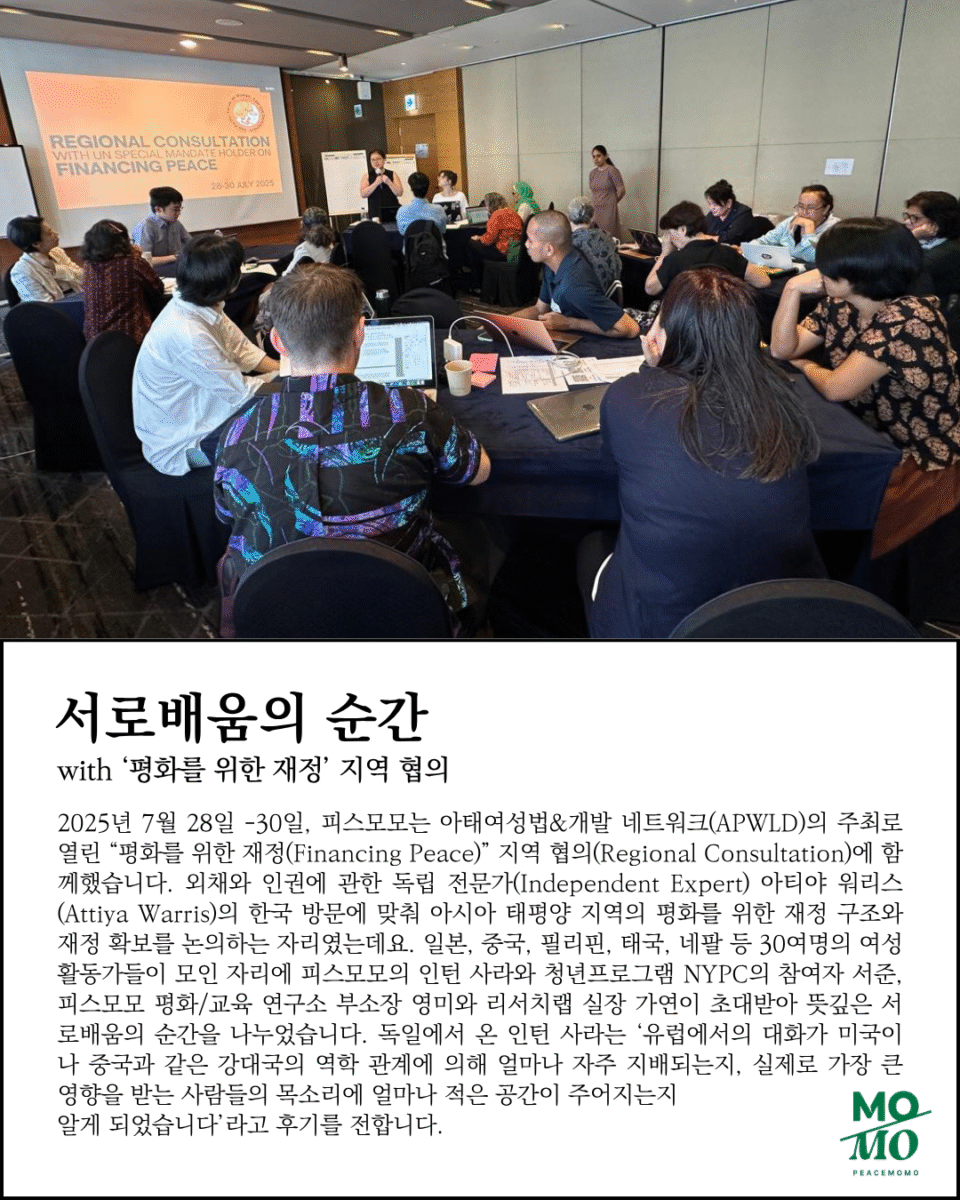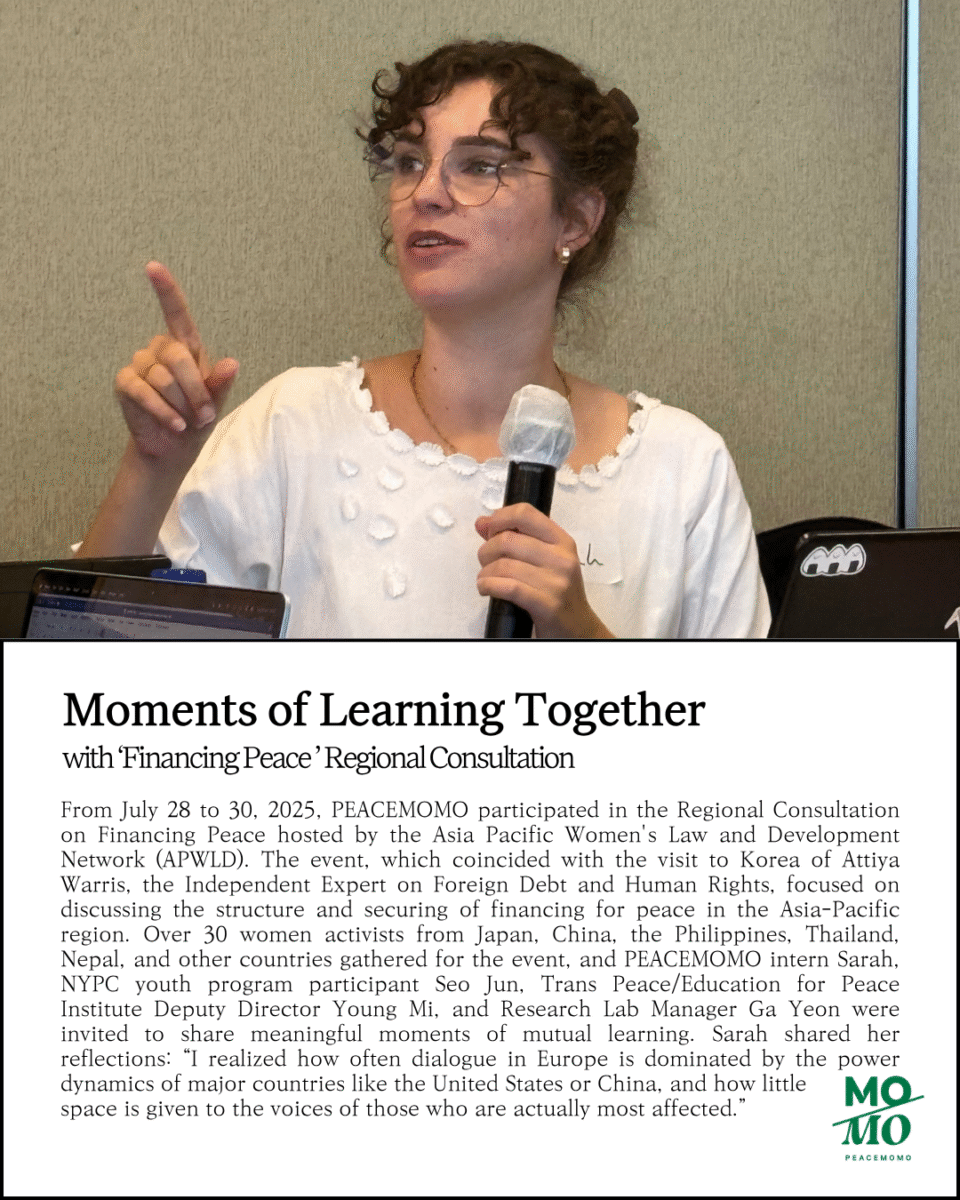
글: 사라 브란트마이어(피스모모 인턴)
APWLD 지역 협의에 참여할 수 있는 기회를 얻게 되어 정말 감사하게 생각합니다. 수많은 여성들이 국경을 넘어 함께 모여 서로의 경험을 공유하고 성찰하며 연대하는 공간을 처음 경험했는데, 그 자체만으로도 저에게 큰 영향을 미쳤습니다. 수많은 여성들이 페미니즘과 평화에 대해 이야기하는 것을 보면서 엄청난 힘을 얻기도 하고, 한편으로는 겸손해지기도 했습니다. 아시아 전역의 여성 활동가들의 경험과 투쟁을 들으면서 특히 아시아 지역에 대해 아직 배워야 할 것이 많다는 것을 깨달았습니다. 또한 유럽에서의 대화가 미국이나 중국과 같은 강대국의 역학 관계에 의해 얼마나 자주 지배되는지, 실제로 가장 큰 영향을 받는 사람들의 목소리에 얼마나 적은 공간이 주어지는지 알게 되었습니다.
컨퍼런스에서 공유된 이야기들이 경각심을 불러일으키기도했습니다. 분쟁의 영향을 받았거나 여전히 그 여파를 겪고 있는 사람들의 생생한 현실에 경악했고, 국제 사회, 특히 독일과 같은 부유한 국가로부터의 지속 가능하고 의미 있는 지원이 부족하다는 사실에 좌절감을 느꼈습니다. 글로벌 금융 기관의 역할과 그들의 글로벌 노스 친화적인 행태에 대해 자세히 배우면서 저는 정말 눈을 뜨게 되었습니다. 독일의 군사비 지출과 무기 수출을 언론이 잘못 묘사한 그래프를 보며 분노를 느꼈고, 세계 분쟁에서 독일의 책임을 촉구하고 군사주의의 부상을 막기 위해 더 많은 대중을 위한 새로운 내러티브가 어떻게 가능한지 생각해 보게 되었습니다.
또 하나 인상 깊었던 것은 아시아에서 미국의 군사적 영향력과 중국에 대한 봉쇄 정책을 보여주는 지도였습니다. 작은 나라들이 직면한 압박을 더 잘 이해하는 데 도움이 되었고, 국제적인 “동맹”과 “안보”에 대해 이야기하는 방식을 다시 생각하게 되었습니다.
동시에 이러한 시스템에 적극적으로 저항하며 정의와 평화를 위한 공간을 만들어가는 여성들의 이야기를 들으며 큰 동기를 얻었습니다. 독일에 살았던 제가 안전한 시민 공간을 이용할 수 있고, 자유롭게 말할 수 있는 특권을 누리고 있었다는 사실과 그 특권을 사용하는 것이 얼마나 중요한지 다시 한 번 생각하게 되었습니다. 특히 군국주의와 불의에 대한 독일의 역할에 대해 침묵하는 것은 곧 공모를 의미한다는 강한 느낌을 받았습니다. 저는 제가 배운 것을 바탕으로 더 많이 참여하고, 국내의 군사주의에 도전하며, 글로벌 사우스의 시민사회 활동가들과 더 진정성 있는 협력을 지원하고 싶습니다.
또한 언어의 중요성과 일상적인 용어와 서술에 의문을 제기하는 것이 얼마나 중요한지 다시 한 번 깨닫게 되었습니다. 앞으로 저는 평화가 실제로 무엇을 의미하는지, 평화의 법칙은 어떤 모습일 수 있는지, 군사적 관점이 아닌 여성주의적 관점에서 안보를 어떻게 재정의할 수 있는지에 대해 더 많이 고민하고 싶습니다.
전반적으로 이번 경험은 저에게 많은 생각과 희망을 주었습니다. 저는 그 자리에서 진정한 연대와 힘을 느꼈고, 이 컨퍼런스가 저에게 오랫동안 기억에 남을 것 같습니다.

Sarah Brandmeier(PEACEMOMO Intern)
I feel really grateful that I got the chance to take part in the APWLD Regional Conference. It was the first time I experienced a space where so many women came together across borders to share, reflect, and stand in solidarity — and that alone had a huge impact on me. It left me feeling both incredibly empowered, seeing so many women talking about feminism and peace and also deeply humbled. Listening to the experiences and struggles of women activists from across Asia made me realize how much I still have to learn, especially about the region. I also noticed how often our conversations in Europe are dominated by big power dynamics like the U.S. and China, and how little space is given to the voices of those actually most affected.
The stories shared at the conference were a wake-up call. I was horrified by the lived realities of people affected by conflict or still dealing with the aftermath and frustrated by the lack of sustainable and meaningful support from the international community, especially from richer countries like mine. Learning more about the role of global financial institutions and how they continue to serve the Global North really opened my eyes. Being confronted by a graph regarding Germany’s military spending and the misleading way its arms exports are portrayed in the media made me feel angry and pushed me to reflect on my country’s responsibilities in global conflicts and how a different narrative for the wider public is needed to stop the rise in militarism.
Another thing that really stuck with me was a map showing U.S. military influence and containment policies in Asia regarding China. It helped me better understand the pressure smaller countries face and made me rethink how we talk about international “alliances” and “security.”
At the same time, it was incredibly motivating to hear from women who are actively resisting these systems and building spaces for justice and peace. I was reminded again of the privilege I carry living in Germany, having access to a safer civil space, being able to speak freely, and how important it is to use that privilege. The conference left me with a strong sense that staying silent, especially when it comes to Germany’s role in militarism and injustice, makes me complicit. I want to use what I’ve learned to get more involved, challenge militarism at home, and support more genuine cooperation with civil society actors in the Global South.
It was also a powerful reminder that language matters and how important it is to question everyday terms and narratives. Moving forward, I want to reflect more on what peace really means and what a law of peace could look like, and how security can be redefined from a feminist, not militarized, perspective.
All in all, this experience gave me a lot to think about and a lot of hope. I felt real solidarity and strength in the room, and I know this conference will stay with me for a long time.

![[후기] 2022 평화교육진행자되기 과정을 돌아보며 by 앙금](https://peacemomo.org/wp-content/uploads/image_1651482564009-220x220.png)
![[기사] 평택시민신문_송탄중 평화교육](https://peacemomo.org/wp-content/uploads/29224_28593_410.jpgzoom1-220x220.jpg)
![[후기] 2025 봄, 임파워링 퍼실리테이션을 마치고 by 이한솔](https://peacemomo.org/wp-content/uploads/2025년-봄_임파워링-퍼실리테이션_이한솔-1-220x220.png)
![[후기] 2023 액숀모모: 아덱스저항행동 by 태인](https://peacemomo.org/wp-content/uploads/image_1699858667566-220x220.png)